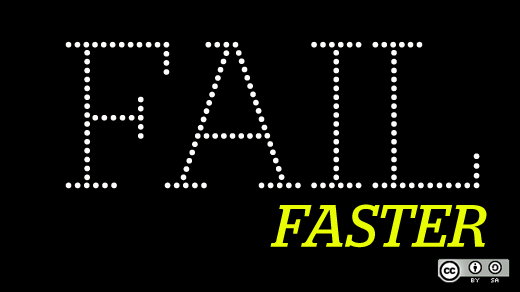HTTP/1.1 200 OK Server: nginx Date: Wed, 02 May 2018 07:45:07 GMT Content-Type: text/html; charset=utf-8 Transfer-Encoding: chunked Connection: keep-alive X-Drupal-Cache: MISS Expires: Sun, 19 Nov 1978 05:00:00 GMT Cache-Control: no-cache, must-revalidate X-Content-Type-Options: nosniff Content-Language: en X-Frame-Options: SAMEORIGIN X-UA-Compatible: IE=edge X-Generator: Drupal 7 (http://drupal.org) Link: ; rel="canonical",; rel="shortlink" Vary: Accept-Encoding X-Request-ID: v-bb11ecbe-4ddc-11e8-86a7-22000b770232 X-AH-Environment: prod X-Varnish: 127802673 Age: 0 Via: 1.1 varnish-v4 X-Cache: MISS Accept-Ranges: bytes You're a failure! Now what? | Opensource.com
Jump to navigation[1]
 Failure is inevitable; the important thing is to know what to do after you fail, says Michael Gat[2], a project manager and data science consultant, in his Lightning Talk, "You're a Failure! Now What?" at the 16th annual Southern California Linux Expo (SCALE[3]). With good humor, Michael's presentation offers ways to tackle failure in order to succeed. One way to be successful in your failures, he says, is to know what types of failures you're best at. Watch Michael's talk to learn more about planning for the failures coming your way. During the UpSCALE Lightning Talks hosted by Opensource.com at the 16th annual Southern California Linux Expo (
Failure is inevitable; the important thing is to know what to do after you fail, says Michael Gat[2], a project manager and data science consultant, in his Lightning Talk, "You're a Failure! Now What?" at the 16th annual Southern California Linux Expo (SCALE[3]). With good humor, Michael's presentation offers ways to tackle failure in order to succeed. One way to be successful in your failures, he says, is to know what types of failures you're best at. Watch Michael's talk to learn more about planning for the failures coming your way. During the UpSCALE Lightning Talks hosted by Opensource.com at the 16th annual Southern California Linux Expo ( 
